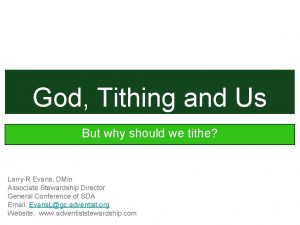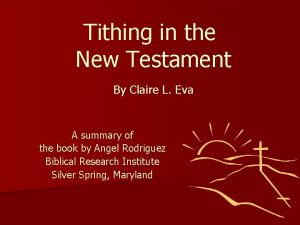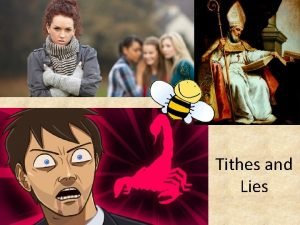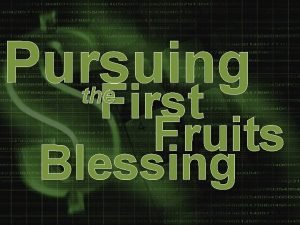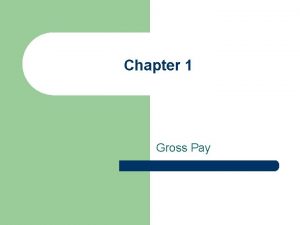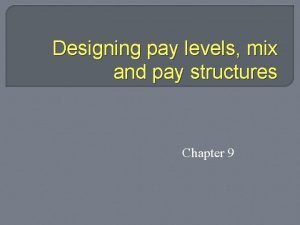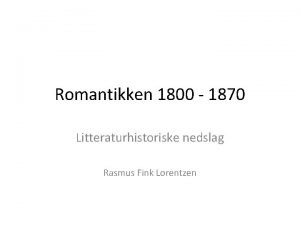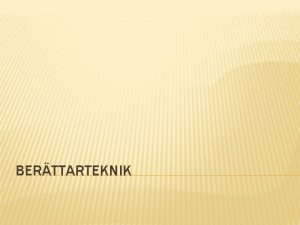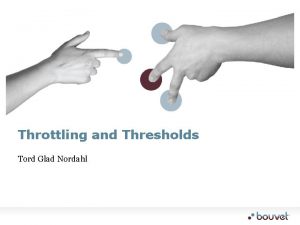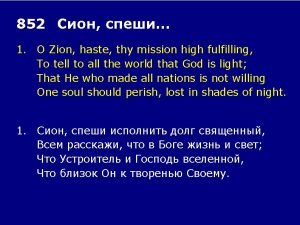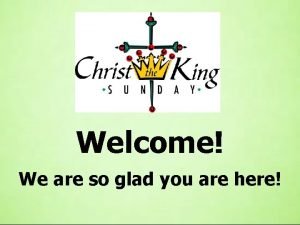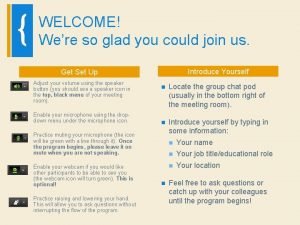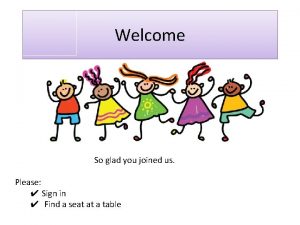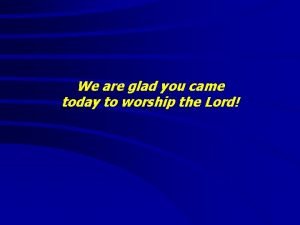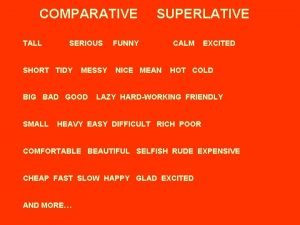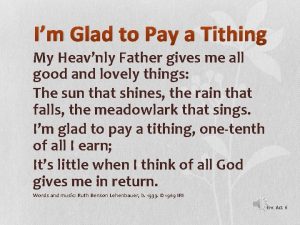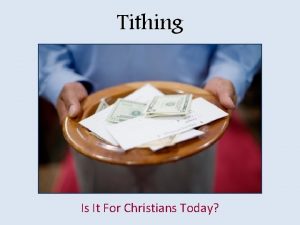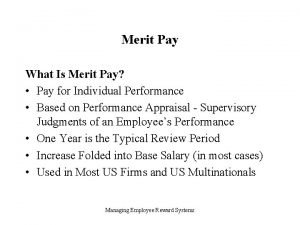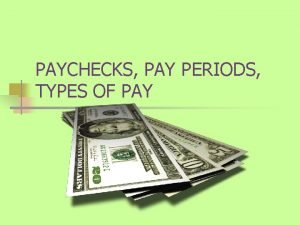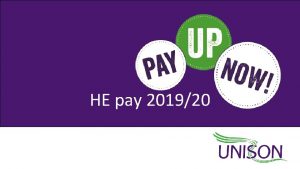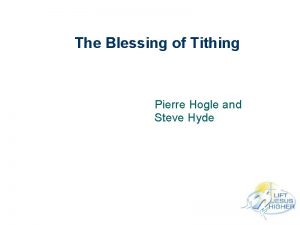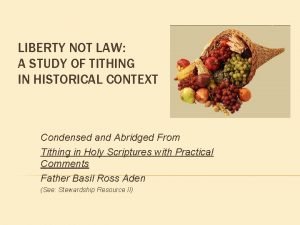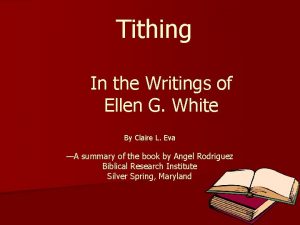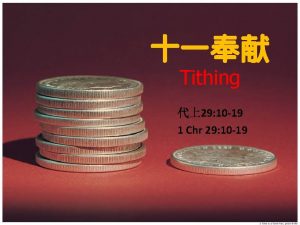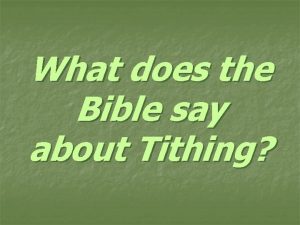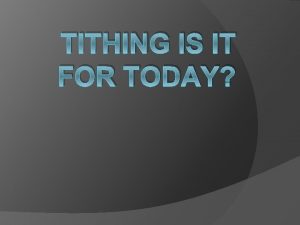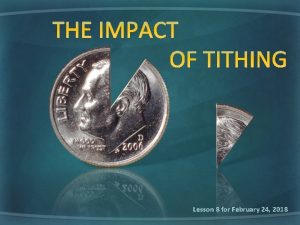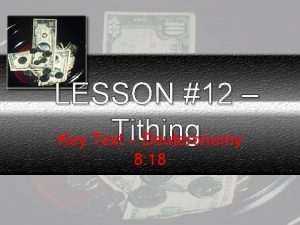Im Glad to Pay a Tithing 1 My










































- Slides: 42

I’m Glad to Pay a Tithing • 1. My Heav’nly Father gives me all good and lovely things: The sun that shines, the rain that falls, the meadowlark that sings. • 2. I’m glad to pay a tithing, one-tenth of all I earn; It’s little when I think of all God gives me in return. • Words and music: Ruth Benson Lehenbauer, b. 1933. © 1969 IRI Enrichment Activity #5

MALACHI TEACHES ABOUT TITHES AND OFFERINGS “Lesson 44: Malachi Teaches about Tithes and Offerings, ” Primary 6: Old Testament, (1996), 196

• This box has a lock on it and contains something important. • There is a key hidden somewhere in the room that will open the box. faith Quietly look for the key. • When it is found, read aloud the word on it.

• The scriptures tell us if we obey the law of tithing we will receive great blessings. faith • For now, we’ll leave the key by the box. • Later in the lesson we will use the key to open the box and discover what blessings are in store for us if we faithfully pay our tithes and offerings.

• Little is known of the life of Malachi except for what is written in the scriptures. • The book of Malachi is the last book in the Old Testament. • Malachi was alive during the same time period as the prophet Nehemiah whom we learned about previously.

• Nehemiah was the prophet who brought many of the Jews released from captivity back to Jerusalem. • Nehemiah told the people God would help them while they rebuilt the temple and city walls.

• Malachi was a prophet who lived near Jerusalem about 430 years before Jesus Christ was born and about 170 years after Lehi and his people left Jerusalem. • This was a time during which God’s people and even the priests who served at the temple were not righteous.

• Malachi prophesied of many things. • Some of the things he prophesied of were John the Baptist, the second coming of Jesus Christ, the return of Elijah and the law of tithing. • Malachi warned the people to pay their tithing.

• The offerings and sacrifices made by the servants of the Lord represented the coming atonement and sacrifice of the Savior. • Only spotless and perfect sacrifices were acceptable.

• The priests of Malachi’s day were offering sacrifices to the Lord with sick, blind, and lame animals and calling them acceptable. • They had no reverence for what they were doing. • Malachi taught the priests that a faithful priesthood bearer is a sincere worshiper.

• Malachi taught the priests that a faithful priesthood bearer acts as if he were in the Lord’s presence when upon the Lord’s errand. • He is honest in all his dealings with others, and his speech is dignified and appropriate. • He walks with the Lord with confidence and assurance and is comfortable in his role of blessing others and leading them into a better way of life.

• As a result of the failure of the priests to judge and lead in righteousness, the people had fallen once again into serious sin. • The people paid tithing by giving one-tenth of their crops or animals. • However, they were giving blind and sick animals and polluted bread as tithing.

• Malachi warned them they were robbing Heavenly Father of sincere tithes and offerings. • He told the people that if they would return to following the Lord that the Lord would return to them. • He told them they would be blessed for their righteousness. He warned them they would be punished if they did not repent.

• The Savior told the Nephites that what Malachi had said about paying tithing was so important that they must write his words in their own records, which we now have in the Book of Mormon. • The Savior quoted all of Malachi chapter 3 and 4 to the Nephites.

Discussion Time!

• What did Malachi say the Lord would do if the people would “return unto [Him]”? • Let’s read Malachi 3: 7 • What does the phrase “return unto me, and I will return unto you” mean? • What did the Lord tell the people to do to repent and “return unto me”? • Let’s read Malachi 3: 8– 10 • If we repent of wrongdoing, how does the Lord “return unto [us]”?

• How did the Lord say the people had robbed him? • Why is not paying tithing, or paying tithing grudgingly, robbing God? • How much of what we have has the Lord given us? • How much of what we have are we asked to give back to the Lord? • Let’s read D&C 119: 3– 4

Elder Le. Grand Richards said: “God introduced the principle of sacrifice in order that his servants and his children might be tested, that they should bring the best of their lands and of their herds. . “They were burned upon the altar of sacrifice; but the giving sanctified the souls of those who gave. . ”

• Everything we have and use comes from Heavenly Father and Jesus Christ. • Someone else may make our clothes or build our homes or package our food, all these things come from the animals, plants, and minerals placed on this earth during the Creation. • One-tenth of what we have is not much to give back to the Lord.

• How is tithing money used? • How does this money bless our lives?

• How are fast offerings used? • To provide food, clothing, and shelter for the poor and needy. • What other offerings can we give to the Lord? • We can pay into the ward or general missionary fund, we can contribute to the Book of Mormon fund, we can contribute to a temple if one is being built in our area, we can give of our time by serving others in our neighborhoods, and so on.

Time to unlock the box faith • I need three volunteers. • Each of you may take out a slip of paper from the box and look up the references. • These scriptures tell us about the blessings we are promised if we pay our offerings and an honest tithe.

• What do you think it means when the Lord promises those who are honest in their tithes and offerings that he will “open you the windows of heaven, and pour you out a blessing, that there shall not be room enough to receive it”? • What other blessings are promised?

• How does paying tithing protect us from the powers of Satan? • As we make sacrifices for the Lord, we draw closer to him and are therefore less influenced by the power of Satan. • Let’s read D&C 64: 23– 24 • What promise about the last days does the Lord make to those who faithfully pay their tithes and offerings?

• Let’s read 1 Corinthians 2: 9 • How does paying our tithing show that we love the Lord? • Why do you think we cannot imagine some of the blessings the Lord has in store for us if we are faithful? • When might these blessings come?

• When blessings do not seem to be pouring out on us, what should we do? • Blessings often come in unexpected ways and may not be recognized at first. • Sometimes we must continue to be faithful and wait until the time is right before we can receive blessings or until we can recognize blessings we have already received.

BUDGET INCOME $10. 00 SAVINGS 1. 50 CANDY . 50 GIFT FOR MOM 5. 00 ENTERTAINMENT 2. 00 TITHING 1. 00 OFFERINGS TOTAL + . 50 $11. 50 • What is wrong with this budget? • If we pay tithes and offerings last, there may not be enough money left.

BUDGET INCOME $10. 00 TITHING 1. 00 OFFERINGS SAVINGS GIFT FOR MOM CANDY ENTERTAINMENT TOTAL . 50 • The first thing we should do when we get money is pay our tithes and offerings.

BUDGET INCOME $10. 00 TITHING 1. 00 OFFERINGS SAVINGS GIFT FOR MOM CANDY ENTERTAINMENT TOTAL . 50 • When we have made the Lord a partner He will help us have enough for our needs as we use the rest of the money wisely.

BUDGET INCOME $10. 00 TITHING 1. 00 OFFERINGS . 50 SAVINGS 2. 50 GIFT FOR MOM 3. 50 CANDY ENTERTAINMENT + TOTAL . 50 2. 00 $10. 00 • If we adjust the budget there is enough money for everything on the list.

Time to pay your tithing! • I have a tithing and offerings envelope for each of you. • I’m going to give each of you different amounts of “money” you have earned. • Fill out the tithing slip according to how much money you received. Enrichment Activity #1

• The Church uses the money from fast offerings to help those who are worthy and in need. • How is money donated to the missionary fund used? • What other offerings might be included in the “Other” category? Enrichment Activity #1

• Where does the money go after people give their donations to the bishop? Enrichment Activity #1

• Let’s read 2 Corinthians 9: 6– 7 • How does it relate to the way we pay our tithes and offerings? Enrichment Activity #2

SMILE OR FROWN Smile for the following sentences that represent a cheerful giver and frown for those that represent giving grudgingly: • a. I feel good when I pay an honest tithe. • b. I know if I do not pay my tithing, my parents will be angry with me. Enrichment Activity #3

SMILE OR FROWN • c. I feel blessed to have enough food to eat, so I am willing to fast. I know the money my parents pay as fast offerings will help the poor. I want everyone to have enough to eat. • d. Just think of all the toys I could buy with my tithing money. Enrichment Activity #3

SMILE OR FROWN • e. The Lord has given me so many blessings; I want to pay an honest tithe to show my gratitude. • f. The Lord has commanded us to pay 10 percent for tithing, so why does he ask us to give more for other things? My tithing should be enough. Enrichment Activity #3

SMILE OR FROWN • g. The Lord wants the gospel preached to everyone on the earth, and I want to do my part in helping the missionaries do this. Enrichment Activity #3

The following story is by Elder Dallin H. Oaks: • “During World War II, my widowed mother supported her three young children on a schoolteacher’s salary that was meager. When I became conscious that we went without some desirable things because we didn’t have enough money, I asked my mother why she paid so much of her salary as tithing. Enrichment Activity #4

• “I have never forgotten her explanation: ‘Dallin, there might be some people who can get along without paying tithing, but we can’t. • The Lord has chosen to take your father and leave me to raise you children. I cannot do that without the blessings of the Lord, and I obtain those blessings by paying an honest tithing. When I pay my tithing, I have the Lord’s promise that he will bless us, and we must have those blessings if we are to get along’ ” (in Conference Report, Apr. 1994, pp. 43– 44; or Ensign, May 1994, p. 33). Enrichment Activity #4

• I have a testimony of the importance of paying tithes and offerings. I have been blessed by obeying this commandment. • I challenge each of you to exercise your faith by paying your tithes and offerings.

• Images and clipart are from lds. org, sugardoodle. net, Microsoft Office, and other websites indicating the images were in the public domain. The hymn and lesson are from lds. org. The story of Malachi is taken from lds. org. • “Book of Mormon Story: The Savior, Malachi, the Nephites, and Us, ” Friend, Nov 1996, 48 • http: //institute. lds. org/manuals/old-testament-institutestudent-manual-2/ot-in 2 -10 -zec-end-34. asp • Please do not use this presentation for commercial use. Feel free to alter the presentation for use in church or home to suit personal preference. • This presentation is intended to supplement, not replace, the lesson manual and scriptures. Teachers should refer to the manual, scriptures and other resources when preparing and conducting the lesson.
 The truth about tithing
The truth about tithing Tithing in the new testament
Tithing in the new testament Tithing statistics
Tithing statistics Benefits of first fruits offering
Benefits of first fruits offering Quotes on tithing
Quotes on tithing How to calculate gross pay
How to calculate gross pay How much did wanda pay in taxes this pay period
How much did wanda pay in taxes this pay period Designing pay levels mix and pay structures
Designing pay levels mix and pay structures Merit pay vs incentive pay
Merit pay vs incentive pay Lær mig o skov at visne glad analyse
Lær mig o skov at visne glad analyse We are glad you are here welcome song lyrics
We are glad you are here welcome song lyrics Were glad you came
Were glad you came Welcome we're glad you're here
Welcome we're glad you're here Publish glad tidings
Publish glad tidings Ledsen gestaltning
Ledsen gestaltning Tord glad nordahl
Tord glad nordahl We are glad you are here
We are glad you are here Psalm 122 i was glad
Psalm 122 i was glad We are so glad you are here
We are so glad you are here Welcome we are so glad you are here
Welcome we are so glad you are here Baie lank intensiewe vorm
Baie lank intensiewe vorm Publish glad tidings
Publish glad tidings Welcome so glad you are here
Welcome so glad you are here Glad curriculum
Glad curriculum Welcome we're so glad you're here
Welcome we're so glad you're here Welcome we are glad you joined us
Welcome we are glad you joined us Glad you joined us
Glad you joined us Welcome we're glad you joined us
Welcome we're glad you joined us Glad tidings of great joy
Glad tidings of great joy Welcome we are so glad you are here
Welcome we are so glad you are here Welcome we are so glad you are here
Welcome we are so glad you are here I am delighted to invite you
I am delighted to invite you Gestalta glad
Gestalta glad Welcome we are glad you are here
Welcome we are glad you are here Welcome we are so glad you are here
Welcome we are so glad you are here We are glad you came
We are glad you came Welcome so glad you are here
Welcome so glad you are here Welcome we're glad you joined us
Welcome we're glad you joined us Glad to greet you
Glad to greet you Welcome we are glad you are here
Welcome we are glad you are here Comparative and superlative exciting
Comparative and superlative exciting Good morning nice to see you
Good morning nice to see you Welcome so glad you are here
Welcome so glad you are here
